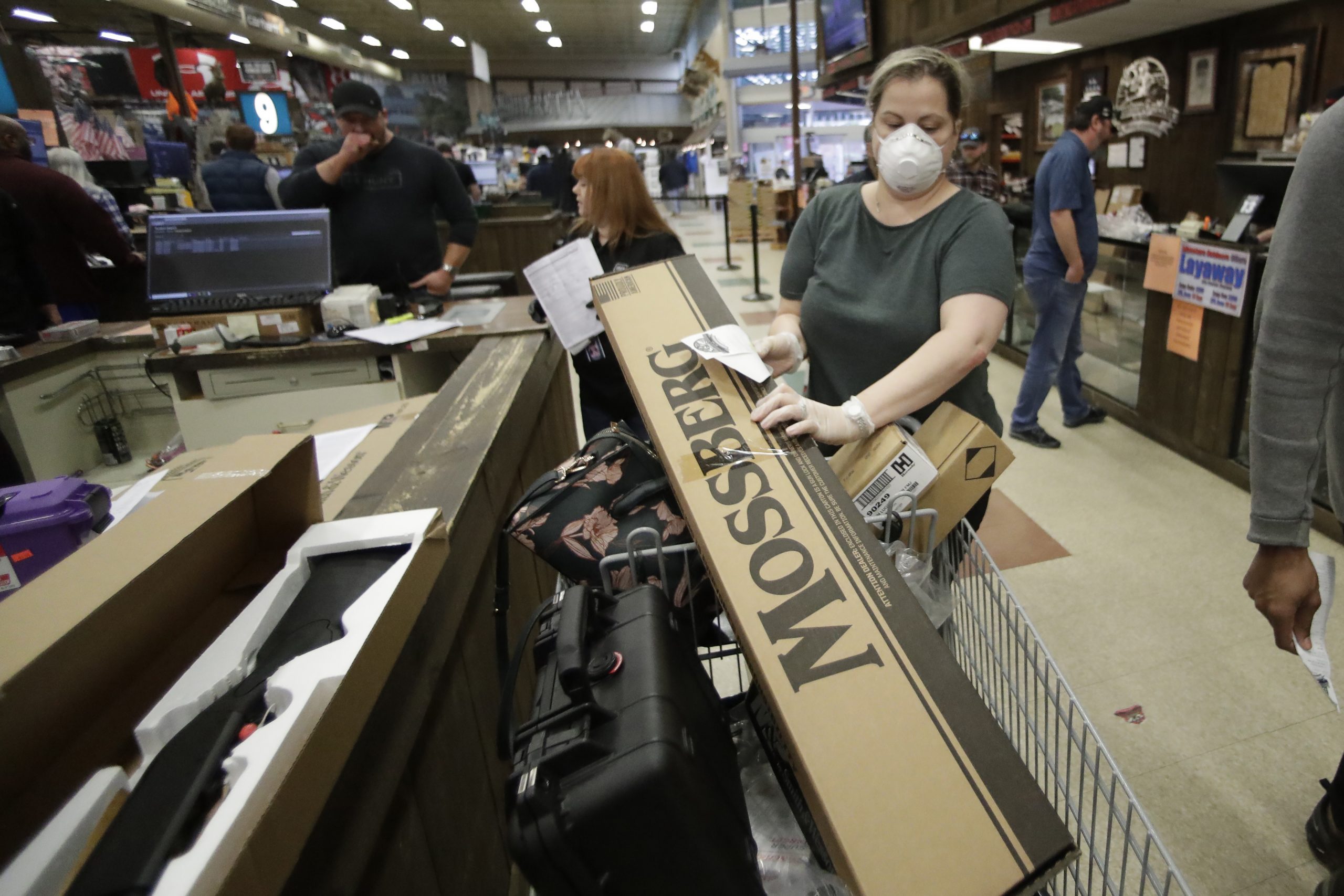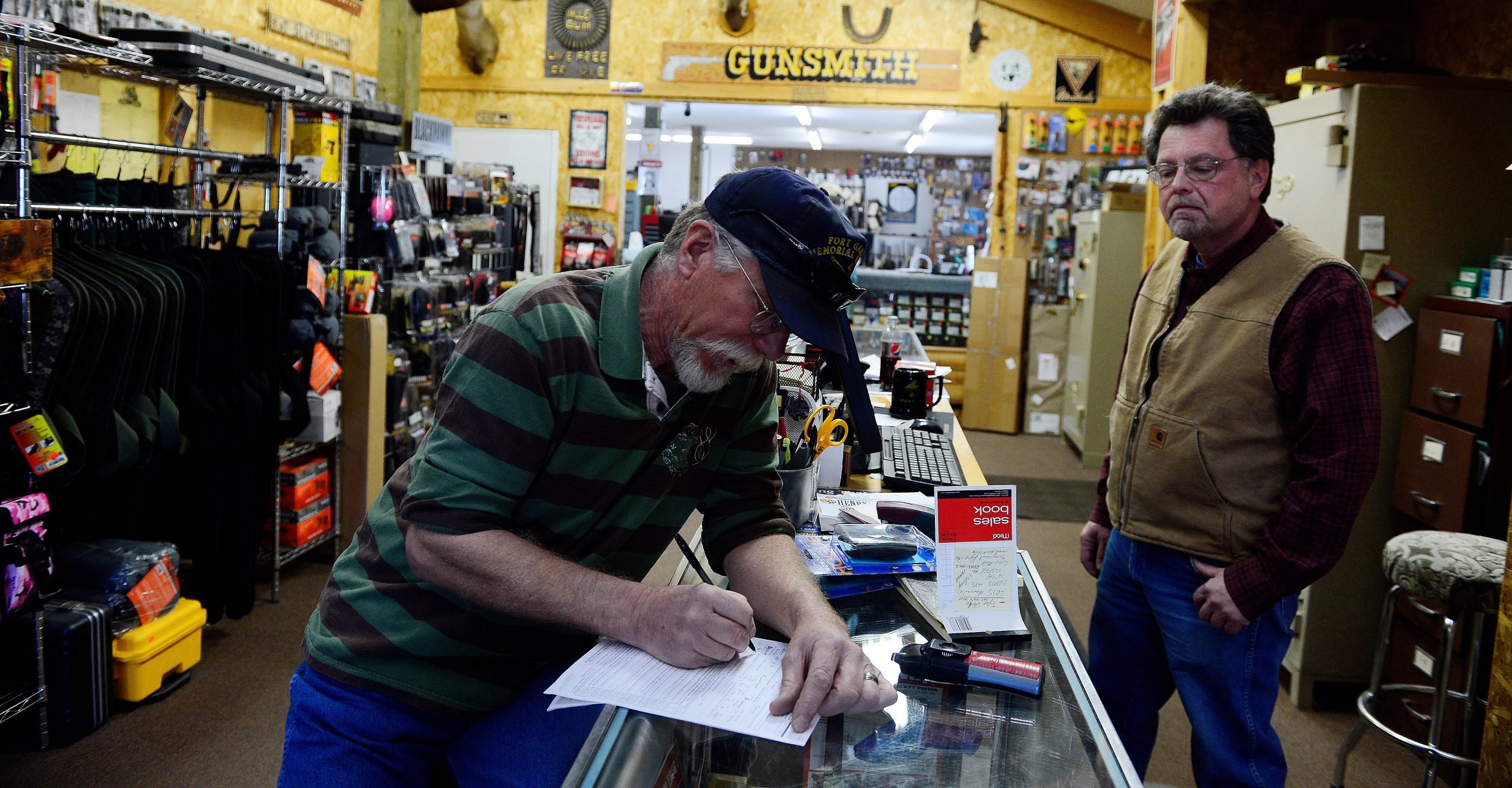On February 27, 2019, House Democrats passed H.R.8, a universal background check bill that is the most significant gun violence prevention legislation to make it through the chamber since the creation of the FBI’s National Instant Criminal Background Check System, or NICS, more than two decades ago. The system screens people when they attempt to buy firearms at licensed dealers and is the government’s first line of defense against gun crime.
The bill establishing NICS spelled out 12 reasons why a person can be denied a gun purchase. Since the system launched in late 1998, NICS has put a stop to more than 1.7 million attempted gun transfers by people with records falling into one of those categories.
The FBI publishes category-by-category breakdowns of how many gun sales it has denied under each of the 12 criteria. The numbers below show which prohibitions have triggered the most denials between NICS’s launch in November 1998 and February 29, 2020, the date of the FBI’s most recent release when this article was last updated.
It’s extraordinarily rare for the gun background check system to block someone by mistake. An audit of the system released in September 2016 by the Department of Justice’s Office of the Inspector General found that, in a sample of denied transactions, NICS had made the correct decision 99.8 percent of the time.
Note: The FBI data accounts only for denials processed by NICS. It does not include denials by the more than a dozen “point-of-contact” states, which conduct their own checks.
1. Convicted of a crime punishable by more than one year or a misdemeanor punishable by more than two years: 895,331
All purchasers are required to fill out a Firearms Transaction Record, or Form 4473, before a background check is initiated. If they lie about their criminal history on the form, they will have committed a new felony punishable by up to five years in prison, though it isn’t clear how often these perjurers are punished.
The federal gun background check system has blocked more than 800,000 people convicted of a crime from acquiring a weapon since 1998.
2. Fugitive from Justice: 194,254
A surprising number of people on the run from open arrest warrants walk into gun stores and try to buy firearms. When a purchaser is flagged as a fugitive, the FBI contacts the agency that issued the warrant to see if it’s still open and if the person has fled the state that issued the warrant. The examiner then alerts those authorities to the address of the Federal Firearms License holder that processed the check. In a few states with proactive policies, this sometimes results in an arrest in the gun store.
The definition of just who qualifies as a fugitive for the purposes of background checks narrowed sharply this year. Up until last year, the FBI considered anyone subject to an arrest warrant a fugitive for the purposes of gun sales. But now the category only applies to people who examiners can prove have left the state where they are wanted for arrest, and even then, only if the wanted person did so to escape authorities.
That’s a tall order for a check that’s supposed to be “instant.” As a result, hundreds of thousands of records of fugitives have been removed from the database, making it easier for them to buy a weapon. However, the FBI doesn’t distinguish between the types of underlying criminal offenses: some of these fugitives may be bank robbers on the run, while others could have just skipped out on child-support payments.
3. Unlawful User/Addicted to a Controlled Substance: 164,287
The third most common reason for being rejected by a federal background check is also the category that should have stopped the man who murdered nine people at a church in Charleston, South Carolina, in 2015, from getting his Glock, since he had confessed to illegal possession of a controlled substance. Despite the fact that the National Institutes of Health estimates almost 25 million Americans used an illicit drug in the past month, the NICS Indices — the FBI database set aside for records of persons banned from guns — only has about 24,000 active drug-related records.
4. Misdemeanor Crime of Domestic Violence Conviction: 155,017
This red flag is strictly limited to misdemeanor convictions for abusing a spouse, live-in significant other, or child. A misdemeanor for violence against a sibling, parent, or an intimate partner who neither shares a child with nor lives with the person charged would not disqualify a purchaser — an aspect of the law sometimes referred to as “the boyfriend loophole.” While the federal government’s other grounds for gun bans were established by the Gun Control Act of 1968, domestic violence only became a prohibiting category after the 1996 passage of an amendment sponsored by Senator Frank Lautenberg of New Jersey.
The gun background check system has more difficulty making denials based on misdemeanor domestic violence convictions than any other category on this list. A Government Accountability Office report released last December found that in nearly 17,900 cases involving domestic abusers between 2006 and 2015, it took the FBI more than three business days to ultimately make a determination and reject the buyer.
The challenges stem from states’ failures to make it clear that a domestic violence record meets the legal test for banning that person from having guns. And those shortfalls are cause for concern: The reason that people guilty of misdemeanor domestic violence aren’t allowed to have guns is that violence toward a spouse or family member is among the clearest risk factors for future homicides, especially mass shootings.
5. State Prohibitor: 97,179
Many states have their own additional categories of prohibited purchasers that they report to the NICS. South Carolina, for example, denies the right to own a gun to anyone known to abuse alcohol. The federal government has no such disqualifier, despite alcohol being the substance known to be most associated with gun violence.
Other states, like California, prohibit people convicted of offenses like misdemeanor assault that fall short of the federal requirements for denying a gun sale, but who may still indicate a propensity toward violence. Clinicians applaud these additional restrictions because someone who engages in low-level aggressive behavior could escalate to more serious and potentially deadly crimes.
6. Under Indictment/Information: 65,753
Anyone who is under indictment for a crime carrying a potential year-long jail sentence — but not yet convicted — is barred from owning a gun while the case is being resolved. These are among the most difficult categories of prohibitions to confirm, since the disposition of charges may not be automatically submitted to the databases that a gun background check scans, forcing inspectors to contact local court clerks to determine whether the purchaser is prohibited.
7. Protection/Restraining Order for Domestic Violence: 63,928
Restraining orders remain in NICS as long they are in effect. Sometimes the orders last forever, but they can also be temporary, in contrast to convictions for crimes which are permanently prohibiting. Gun restrictions on those who have received such orders are believed to be among the most effective reducers of domestic homicide. Sixty percent of intimate partner homicides are committed with guns, and the risk of death grows five-fold if a woman is in an abusive relationship with a man who has access to a gun.
8. Adjudicated Mental Health: 46,266
Disqualifying mental health records form the second-largest body of records held by the NICS Indices. Simply receiving a diagnosis of a severe mental illness like schizophrenia is not enough to bar an American from gun ownership — a judge must legally declare a person mentally unfit to own a gun or involuntarily commit him or her to a mental institution.
Though NICS does have access to a large number of disqualifying mental health records, an unknown number of cases are still not reported. In the case of the gunman who opened fire at a movie theater Lafayette, Louisiana, in July 2015, a judge considered his severe mental health problems in 2008, but doctors ultimately did not recommend that he be involuntarily committed. Even if they had, Georgia law would have required the purging of any records of that commitment by 2013, before the man purchased his gun.
9. Illegal/Unlawful Alien: 29,182
The NICS Indices hold more records on illegal/unlawful aliens than any other type of prohibited purchaser — more than 7 million. But few unlawful immigrants try to buy guns from licensed dealers and wind up raising flags, especially compared to would-be buyers with criminal pasts.
You don’t need to be an American citizen to pass a gun background check. The FBI allows sales to foreigners who are legally in the country, so long as they are a permanent resident, have come legally without a visa and meet residency requirements, or have a visa and a hunting or sporting license.
10. Federally Denied Persons File: 6,367
This is a catch-all category that includes various people whom the FBI deems ineligible to possess a firearm even though the relevant state records may not be entered into NICS or the National Crime Information Center. Also included in the Federally Denied Persons File are people who may not possess guns as a result of a deferred judgement.
11. Dishonorable Discharge: 1,258
Violations of military conduct are handled by the armed services’ internal judicial system, which does not distinguish between the felonies and misdemeanors that become the basis for gun bans for civilians. To account for the military personnel kicked out of the services under the most serious circumstances — a dishonorable discharge — the gun background check system includes these records as their own category.
12. Renounced U.S. Citizenship: 101
According to the State Department, anyone who formally renounces American citizenship also “must renounce all the rights and privileges associated with such citizenships.” That includes Second Amendment rights. Denials under this category are exceedingly rare.
How often do “false positives” occur? Very rarely.
At least one frequent commenter on gun policy has suggested that false NICS denials are a “major problem.” In a New York Times editorial, John Lott, the oft–debunked economist whose work is often touted by the National Rifle Association, noted that few people blocked from buying a gun ever face prosecution, despite the fact that lying on a gun background check is a federal crime. Lott then leapt to the conclusion that the scarcity of prosecutions must mean that most of those denials were due to false positives.
In fact, prosecutions of denied gun purchasers are rare because the cases make poor fits for the workloads of U.S. Attorneys. In states that have their own laws or policies for cracking down on fraudulent gun background check applications, arrests and prosecutions are comparatively common.
A better way to measure how often Americans are mistakenly barred from guns is to look at the percentage of denials that are successfully appealed.
The upshot: less than 1 percent of one percent of denied gun transfers are overturned because of false positives.



